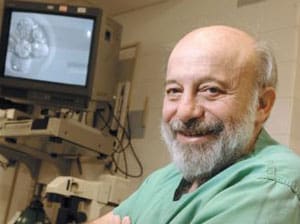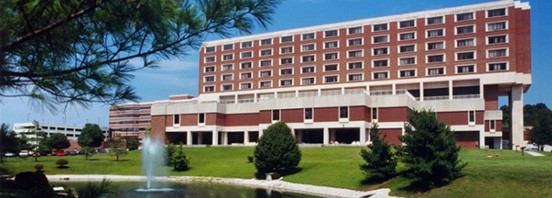By Barbara Maynard
St. Louis Business Journal, October 5, 2007

For three decades, Dr. Sherman Silber, 65, has been treating difficult cases at The Infertility Center of St. Louis on the campus of St. Luke’s Hospital in Chesterfield. Silber either developed or perfected many of the techniques he uses. His career is a succession of firsts — the world’s first microsurgical vasectomy reversal, the first testicle transplant, the first ovary transplant in the United States, and the list goes on.
“I have known Dr. Silber for probably 25 years,” said St. Luke’s administrator, Jan Hess. “He is always doing some kind of work that is cutting edge.”
But Silber never planned on a career treating infertility.
“It was completely unexpected,” he said. After medical school at theUniversity of Michigan [see video], Silber worked as an intern in Alaska[see video] with the U.S. Public Health Service. At the time, the state needed a urologist, so Silber learned on the job. He left Alaska for a residency in urology at the University of Michigan, but soon found that he was more interested in microsurgical techniques for kidney transplantation.
Silber followed that interest to the University of Melbourne Medical School in Australia, where he was an assistant professor, and eventually accepted an academic position at the University of California Medical School in San Francisco. Vasectomies were becoming popular, so Silber decided to apply his skills to vasectomy reversal [see video], a “hobbyist project” for which he thought there might be a small demand. Little did he know that the success of the operation would change the course of his professional life.
As the media broadcast the story worldwide, the opportunity became clear — there was a great demand for successful infertility treatments. Silber moved to his wife’s hometown of St. Louis to establish his own clinic.
Silber said the treatment of infertility was in its infancy, so many of the treatments he uses today he developed himself and in collaboration with colleagues. One such technique for men with low sperm counts is called intra cytoplasmic sperm injection.
“Overnight we solved the problem of male infertility,” he said. “We could retrieve sperm from men who we thought had no sperm production at all.”
More recently, Silber has made headlines for transplanting ovarian tissue between twins. In each case, the recipient had either undergone cancer treatment or had suffered premature menopause. The transplants enabled most of the women to conceive.
n February, Silber transplanted a whole ovary [see video] from one woman to her non-twin sister. Normally, organ transplants between anyone other than identical twins requires the recipient to take immune suppressing drugs to prevent rejection, but this case was unusual. The sisters are an unusually close match, and they had already undergone bone marrow transplants as part of the cancer treatment.
Beyond transferring fertility from one sister to another, Silber expects such operations to help women to preserve their own fertility. By using new techniques to freeze tissue, a woman in her twenties or early thirties could have some of her ovarian tissue removed, frozen, and transplanted back into her body at a later time. This strategy could help women facing cancer treatment as well as younger women who would like to be able to bear children later in life. Only about 1 percent of women are infertile at the age of 20, but that percentage jumps to 30 percent by age 35 and to 60 percent by age 40, he said.
An English major in college, Silber has written a popular series of books. The latest updated version, entitled How to Get Pregnant, was released in paperback in 2007.
Humans are not the only species to benefit from Silber’s talents. He also has worked on chimpanzees, South American bush dogs and other endangered species. This month, Silber is scheduled to reverse a vasectomy on a Przewalski horse, which is extinct in its native Mongolia and northern China.
Silber and his wife, Joan, have been married for 41 years. They have three sons.
See also:

